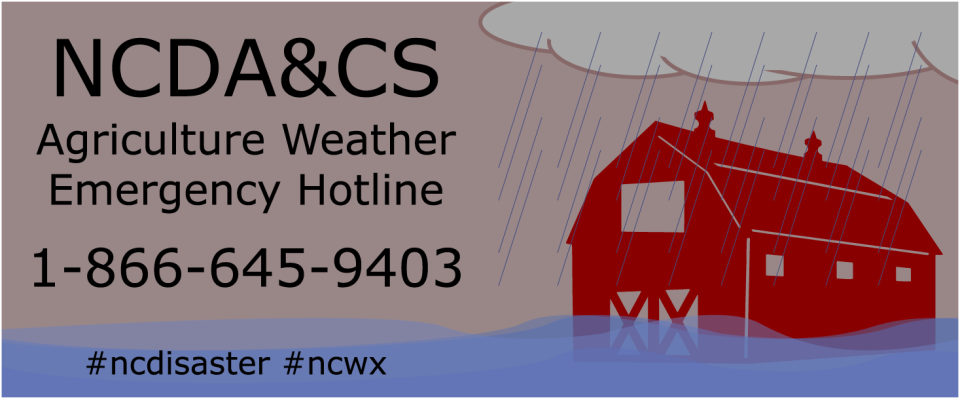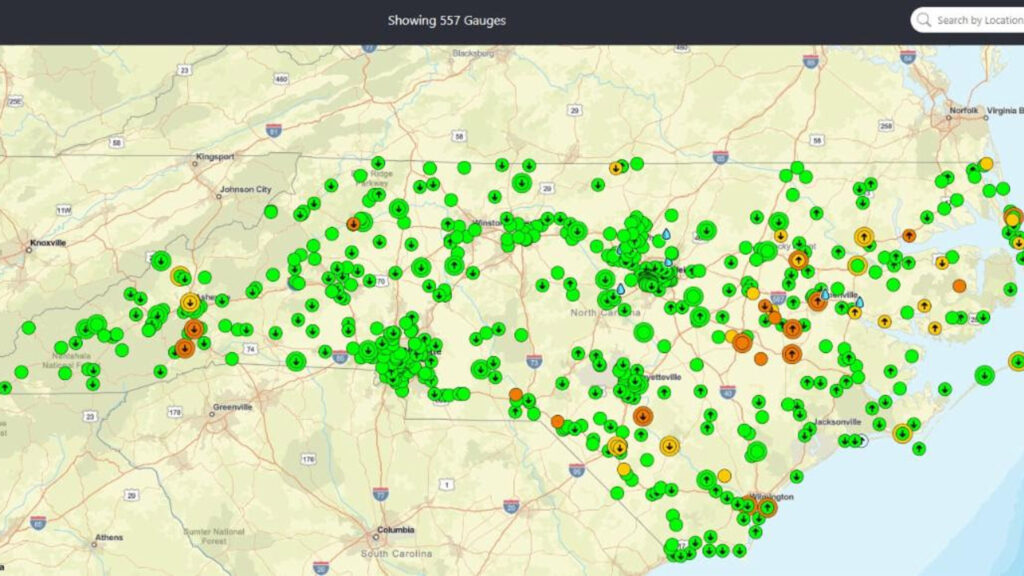Hurricane Helene Update From NCDA&CS (10/1/24)
go.ncsu.edu/readext?1030882
en Español / em Português
El inglés es el idioma de control de esta página. En la medida en que haya algún conflicto entre la traducción al inglés y la traducción, el inglés prevalece.
Al hacer clic en el enlace de traducción se activa un servicio de traducción gratuito para convertir la página al español. Al igual que con cualquier traducción por Internet, la conversión no es sensible al contexto y puede que no traduzca el texto en su significado original. NC State Extension no garantiza la exactitud del texto traducido. Por favor, tenga en cuenta que algunas aplicaciones y/o servicios pueden no funcionar como se espera cuando se traducen.
Português
Inglês é o idioma de controle desta página. Na medida que haja algum conflito entre o texto original em Inglês e a tradução, o Inglês prevalece.
Ao clicar no link de tradução, um serviço gratuito de tradução será ativado para converter a página para o Português. Como em qualquer tradução pela internet, a conversão não é sensivel ao contexto e pode não ocorrer a tradução para o significado orginal. O serviço de Extensão da Carolina do Norte (NC State Extension) não garante a exatidão do texto traduzido. Por favor, observe que algumas funções ou serviços podem não funcionar como esperado após a tradução.
English
English is the controlling language of this page. To the extent there is any conflict between the English text and the translation, English controls.
Clicking on the translation link activates a free translation service to convert the page to Spanish. As with any Internet translation, the conversion is not context-sensitive and may not translate the text to its original meaning. NC State Extension does not guarantee the accuracy of the translated text. Please note that some applications and/or services may not function as expected when translated.
Collapse ▲This update post contains important information from the North Carolina Department of Agriculture Veterinary Division’s newsletter. To subscribe to the newsletter, please send an email to Joe.Web@ncagr.gov.
Agriculture Emergency Hotline
The N.C. Department of Agriculture and Consumer Services hotline is active. This hotline is to connect farmers with resources that can assist with damage and other agricultural emergencies related to the storm. The toll-free number is 1-866-645-9403. A live operator will be available daily between 8 a.m. and 5 p.m. 
Livestock Assistance Portal
For those in need of hay, feed or other essential livestock goods and services, there are two ways to request assistance:
- Fill out a Livestock Assistance Form online if you are able
- If you are unable to fill out the Livestock Assistance Form you may also call the hotline: 1-866-645-9403
For those wishing to donate hay, feed, or other essential livestock goods and services or for anyone interested in providing assistance by housing livestock:
- Please fill out a Livestock Assistance Form online if you are able
- If you are unable to fill out the Livestock Assistance Form you may also call the hotline: 1-866-645-9403
- If needed, you will be contacted by someone from NCSU or NCDA. Thank you for your willingness to help!
Many thanks to NC State Extension and the N.C. Cattlemen’s Association for their support developing and managing this Livestock Assistance Portal.
Existing Recovery and Resilience Programs
Various disaster programs may be available to provide financial assistance for purchasing feed:
USDA Disaster Relief Programs
USDA issued a press release on September 24, 2024, that contains information about their disaster relief programs:
For available USDA FSA (Farm Service Agency) programs, visit:
American Veterinary Medical Foundation (AVMF) Grants
AVMF Disaster Reimbursement Grants
AVMF Disaster Relief Grants are for the purpose of assisting veterinarians and veterinary students who have experienced an emergency need for basic necessities due to a disaster. Up to $2,000 may be issued per grantee for out-of-pocket expenses incurred immediately following the disaster. A disaster would include but is not limited to, flooding, earthquakes, tornadoes, hurricanes, wildfires, or oil spills in an area that has been declared a disaster area at the local, county, state or federal level.
FDA Resources for Human and Animal Food Producers Affected by Flooding
State and federal resources are available for human food producers as well as animal food producers who are experiencing a severe weather event. This would apply to producers harvesting, mixing, storing, or distributing grains or other foods.
Flood Inundation Mapping & Alert Network (FIMAN)
Interactive mapping tool allows you to view current flooding stages and expected peak stage for many streams and rivers across NC:



